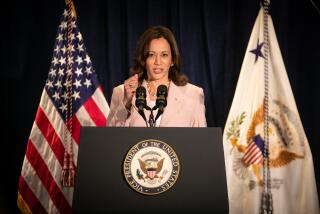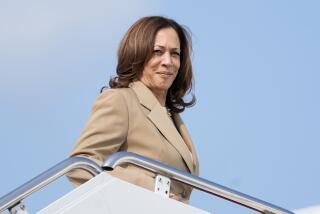Cash-Short Campaigns Push for Early Victories : Reports Show Several Candidates Nearly Broke as Crucial Iowa, New Hampshire Contests Near
- Share via
WASHINGTON — With the 1988 presidential campaign just beginning to enter its most expensive phase, several of the 13 Democratic and Republican contenders already are nearly broke, financial reports filed this week with the Federal Election Commission show.
Republican hopeful Rep. Jack Kemp of New York, for example, raised more than $7 million but spent more than $10 million in 1987 and entered 1988 with nearly all his expected $3.9 million in federal matching funds obligated to pay debts.
Democratic Sen. Paul Simon of Illinois raised just under $3.8 million but spent $5.8 million, his FEC filings show. He, too, was facing the prospect of spending much of his $1.9 million in federal matching funds on paying off debts.
Filings Repeat Stories
Financial filings by Rep. Richard A. Gephardt (D-Mo.) and former Gov. Bruce Babbitt of Arizona tell similar stories.
Even Massachusetts Gov. Michael S. Dukakis, the Democrats’ champion fund-raiser, cannot rest easy. Dukakis gathered more than $10 million in 1987 and entered 1988 with more than $2 million in cash. But Dukakis has an expensive national campaign apparatus to feed, and his payroll alone was running at more than $600,000 a month in the last part of 1987, his financial filings show.
All this goes to prove why a relative handful of voters in two small states over the next few weeks may be able to drive nearly half the contenders for the Democratic and Republican presidential nominations out of the race.
All the candidates seem to have enough cash to run a full campaign through Iowa’s first-in-the-nation caucuses Monday. But without a sudden burst of new funds in February, very few will be around to compete in March. And the only way to get a lot of money, veteran fund-raisers agree, is to win early.
Before voting begins, contributors may be willing to give money in hopes that a campaign will catch on. But once votes start being counted, no one wants to give to a loser.
For those who fail to get at least 10% of the vote in two consecutive primaries, the Federal Election Commission stops paying federal matching funds. The government, using money from the $1 checkoff on federal income tax returns, matches the first $250 of each contribution a campaign receives from an individual.
“If you win early, money comes,” said Robert Beckel, who was Walter F. Mondale’s 1984 campaign manager. “If you don’t, you’re out. The lack of money is the single biggest eliminator in presidential politics.”
The unusually large field of 1988 candidates has raised and spent a record amount of money, about $87 million as of the end of last year. No simple equation exists to turn all that money into votes. One candidate may spend huge sums and convince almost no one, the fate of former Texas Gov. John B. Connally in the 1980 Republican race.
But one equation does hold: no money, no campaign.
Even without staff salaries, office rents, telephone banks and advertising, just keeping a candidate flying around the nation doing the sort of things that attract television cameras and voters’ attention costs roughly $100,000 a week, experienced campaign managers estimate.
Of the 13 candidates, the Republicans in the greatest jeopardy without an early victory are Kemp, former Delaware Gov. Pierre S. (Pete) du Pont IV and former Secretary of State Alexander M. Haig Jr., all of whom are hoping that either Vice President George Bush or Sen. Bob Dole of Kansas will stumble early and provide an opening.
Prepare All-Out Efforts
On the Democratic side, Simon, Gephardt, Dukakis and Babbitt all are scraping together their money for all-out efforts to win credibility--and future funds--in Iowa and New Hampshire, which holds the campaign’s first primary a week from Tuesday. Gephardt’s FEC statement shows that he raised $4.3 million in 1987 and spent $5.2 million. Babbitt raised $1.7 million and spent $2.4 million.
Of the remaining candidates, Bush, who has raised $18.6 million and had more than $5 million in cash at the beginning of the year, and Dole, who had more than $2 million left over from the $13.8 million he had raised, both seem to have enough money stockpiled to keep their campaigns going through early losses.
And Democratic Sen. Albert Gore Jr. of Tennessee, competing only mildly in the first two contests, has hoarded his money for a major push in the March 8 Super Tuesday primaries in the South. He entered the year with close to $900,000 in cash on hand.
Finally, three candidates--Democrats Gary Hart and the Rev. Jesse Jackson and Republican Pat Robertson--operate by somewhat different rules than the rest.
Robertson, who has raised $14 million but spent it as fast as it has come in, and Jackson, who has run a comparatively low-budget $2-million campaign, both can rely on enthusiastic volunteers to work for them and spread word of their candidacies if the money runs out.
Attracts Media Attention
Hart has prided himself on a “guerrilla campaign” that has survived in large part because of the candidate’s ability to attract news media attention without a large budget. Because Hart re-entered the race only in mid-December after dropping out last May, no accurate gauge of his spending will be available until January’s FEC reports are filed later this month.
In addition to showing overall amounts of fund raising and spending, the FEC statements also provide some clues about the candidates’ strategies. Kemp, for example, has been devoting a huge percentage of his budget to a massive direct mail campaign, both to raise money and to attract voters in Iowa and New Hampshire.
In Iowa, Kemp letters to potential caucus goers accused Bush and Dole of jeopardizing Social Security benefits. In New Hampshire, his letters attacked the other two candidates for their support of an oil import fee, unpopular in northern New England, where winter heating oil is one of the largest items in many household budgets.
Direct mail and television advertisements also accounted for most of the $1 million in debts Kemp owed at the end of the year.
Kemp Rises in Polls
The investment so far has provided some payoff for Kemp, whose standing in New Hampshire polls rose noticeably after the oil import fee mailing.
And the seemingly endless Michigan Republican delegate selection process, which turned into an obscure and convoluted battle complete with lawsuits and rump or unofficial conventions, cost both Bush and Robertson heavily.
Robertson spent $308,000, for example, in his attempt to capture Michigan’s caucuses. Bush reported even more, an astounding $804,000, almost twice as much as he spent in Iowa in 1987 and vastly more than his spending in any other state.
Bush’s spending came to roughly $21,000 for each of the 37 Michigan delegates he will take to New Orleans for the GOP convention in August.
Money Spread Thinly
By contrast, the delegates captured in the 20 Super Tuesday primaries and caucuses on March 8 will be cheap because even the wealthiest candidates will have to spread their money thinly. At the same time, the aggregate cost will be high, and that will pose the final, probably insurmountable, hurdle for any candidates who do not do well enough to raise large amounts after Iowa and New Hampshire.
“Just for Super Tuesday, $5 million to $6 million would be if anything conservative, it would be at the low end,” said Charles T. Manatt, the former Democratic National Committee chairman and prominent fund-raiser who serves as Simon’s national campaign chairman.
Beckel estimates the cost at $7 million to $10 million. And Ted Kauffman, who was Delaware Sen. Joseph R. Biden Jr.’s campaign manager before Biden dropped out of the Democratic race, said he had estimated his campaign would spend at least $8 million on the Southern races.
“There’s no way” to do the sort of campaign for the March 8 primaries that most candidates would like, said another former Mondale aide, Michael Berman, the campaign treasurer in 1984 and a campaign consultant now.
Candidates flirt with violating federal spending rules. Page 17.
More to Read
Get the L.A. Times Politics newsletter
Deeply reported insights into legislation, politics and policy from Sacramento, Washington and beyond. In your inbox twice per week.
You may occasionally receive promotional content from the Los Angeles Times.











